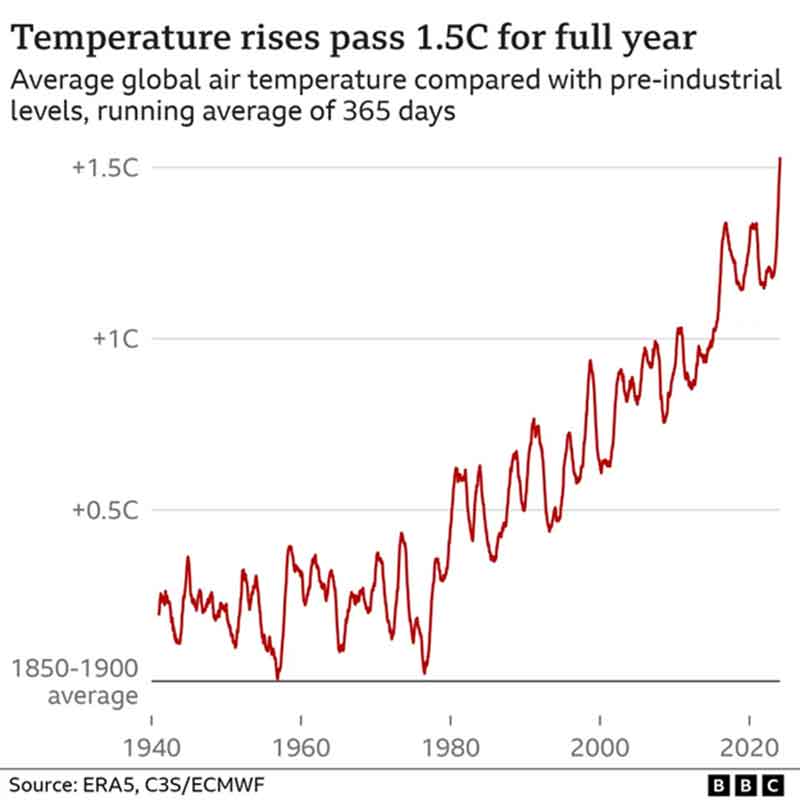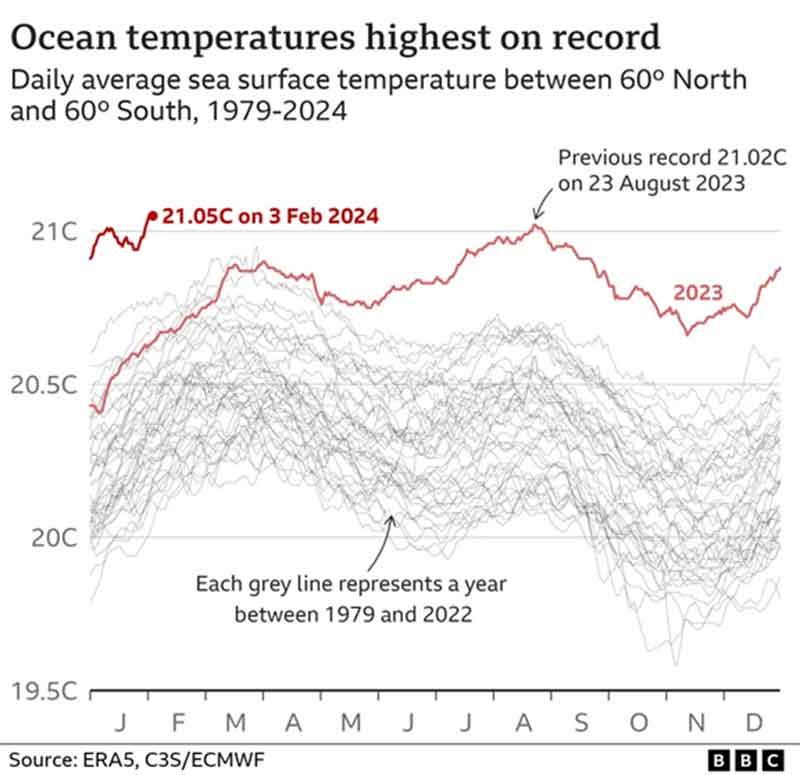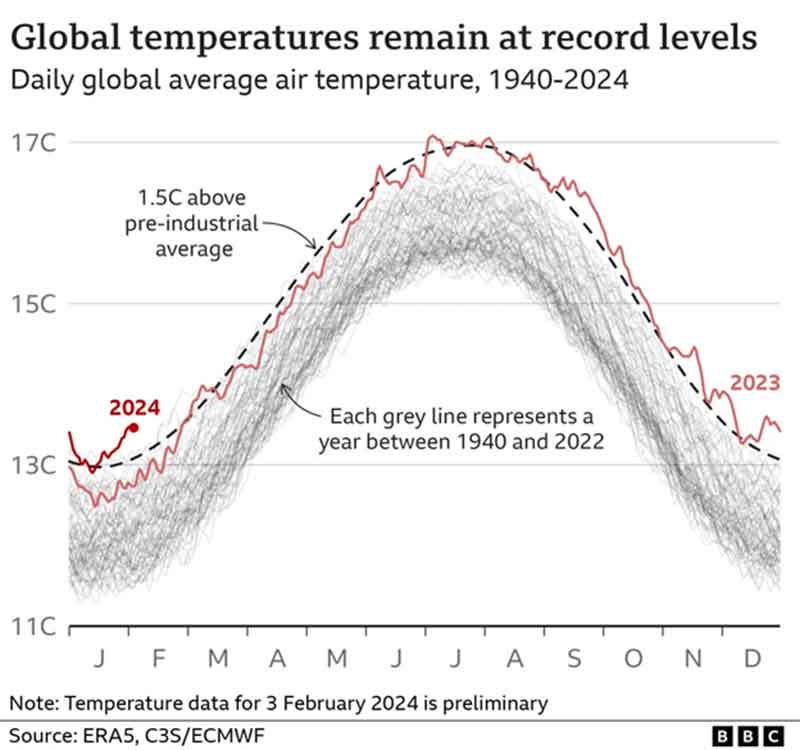
For the first time, world temperature has exceeded 1.5C across an entire year, reports the Copernicus Climate Change Service (C3S), European Union’s climate service. This year-long breach is no major surprise. January was the eighth record warm month in a row.
Samantha Burgess, the deputy director of the C3S, said: “2024 starts with another record-breaking month – not only is it the warmest January on record but we have also just experienced a 12-month period of more than 1.5C above the pre-industrial reference period.
The C3S also found that the average surface air temperature in January of 13.14C was 0.7C above the 1991-2020 average.
January was the eighth month in a row to become the warmest on record for the respective month of the year, said C3S.
It followed 2023 becoming the hottest on record, with temperatures exceeding those of any period in at least the last 100,000 years. July 2023 was the hottest month on record, while Antarctic sea ice was also at an historic low.
Science group Berkeley Earth says the calendar year 2023 was more than 1.5C above pre-industrial levels.
Other science organizations including the US NASA put the past 12 months slightly below 1.5C of warming.
Despite exceeding 1.5C in a 12-month period, the world has not yet breached the 2015 Paris Agreement target, which is measured over decades, not months.
The UN’s IPCC climate panel has warned that the world will likely heat beyond 1.5C in the early 2030s as planet-heating emissions from the burning of fossil fuels have continued to rise.
In 2015, World leaders promised to try to limit the long-term temperature rise to 1.5C, which is seen as crucial to help avoid the most damaging impacts.
This first year-long breach does not break that landmark “Paris agreement”, but it does bring the world closer to doing so in the long-term.
Scientists claim: Urgent action to cut carbon emissions can still slow warming.
Samantha Burgess said: “Rapid reductions in greenhouse gas emissions are the only way to stop global temperatures increasing.”
“It is not a threshold beyond which climate change will spin out of control,” said Prof Myles Allen of the University of Oxford and Gresham College, and a lead author of the UN’s landmark 2018 report. Prof Allen said: “Every tenth of a degree of warming causes more harm than the last one.”
A STEP IN THE WRONG DIRECTION
A BBC report said:
‘”To go over [1.5C of warming] on an annual average is significant,” says Prof Liz Bentley, chief executive of the Royal Meteorological Society. “It is another step in the wrong direction. But we know what we have got to do.”
‘Limiting long-term warming to 1.5C above “pre-industrial” levels – before humans started burning large amounts of fossil fuels – has become a key symbol of international efforts to tackle climate change.
‘A landmark UN report in 2018 said that the risks from climate change – such as intense heatwaves, rising sea-levels and loss of wildlife – were much higher at 2C of warming than at 1.5C.
‘But temperatures have kept rising at a concerning pace, data from the EU’s Copernicus Climate Change Service from the past year shows, illustrated in the graph above. ‘The period from February 2023 to January 2024 reached 1.52C of warming.
‘These small differences are mainly due to the way global temperatures are estimated for the late 1800s, when measurements were more sparse.
‘But all the major datasets agree on the recent warming trajectory and that the world is in by far its warmest period since modern records began – and likely for much longer.’
SEA SURFACE TEMPERATURE
The BBC report added:
‘The world’s sea surface is also at its highest ever recorded average temperature – yet another sign of the widespread nature of climate records. As the chart below shows, it’s particularly notable given that ocean temperatures do not normally peak for another month or so.’

THE FACTOR THAT DRIVES UP THE TEMPERATURE
The BBC report said:
‘The long-term warming trend is unquestionably being driven by human activities – mainly from burning fossil fuels, which releases planet-warming gases like carbon dioxide. This is also responsible for the vast majority of the warmth over the past year.
‘In recent months, a natural climate-warming phenomenon known as El Niño has also given air temperatures an extra boost, although it would typically only do so by about 0.2C.
‘Global average air temperatures began exceeding 1.5C of warming on an almost daily basis in the second half of 2023, when El Niño began kicking in, and this has continued into 2024. This is shown where the red line is above the dashed line in the graph below.

‘At the current rate of emissions, the Paris goal of limiting warming to 1.5C as a long-term average – rather than a single year – could be crossed within the next decade.
‘This would be a hugely symbolic milestone, but researchers say it wouldn’t mark a climate cliff edge.
‘An extra half a degree – the difference between 1.5C and 2C of global warming – also greatly increases the risks of passing “tipping points”.
‘These are thresholds within the climate system which, if crossed, could lead to rapid and potentially irreversible changes.
‘For example, if the Greenland and West Antarctic Ice Sheets passed a tipping point, their potentially runaway collapse would cause “catastrophic” rises to global sea-levels over the centuries that followed, Prof Bentley says.’
MAKE A DIFFERENCE
The report said:
‘But researchers are keen to emphasize that humans can still make a difference to the world’s warming trajectory.
‘The world has made some progress, with green technologies like renewables and electric vehicles booming in many parts of the world.
‘This has meant some of the very worst case scenarios of 4C warming or more this century – thought possible a decade ago – are now considered much less likely, based on current policies and pledges.
‘And perhaps most encouragingly of all, it is still thought that the world will more or less stop warming once net zero carbon emissions are reached. Effectively halving emissions this decade is seen as particularly crucial.
‘”That means we can ultimately control how much warming the world experiences, based on our choices as a society, and as a planet,” says Zeke Hausfather, a climate scientist at U.S. group Berkeley Earth.’
EXPERTS’ SAY
A report by The Telegraph said:
‘“This does not mean we have breached the Paris global warming mark of 1.5C – that refers to long-term warming, which is currently about 1.25C,” said Prof Richard Betts, the head of climate impacts research at the Met Office Hadley Centre, UK.
‘“Nevertheless, it is yet another reminder of the profound changes we have already made to our global climate which we now need to adapt to, whilst urgently redoubling our efforts to limit further heating of the planet.”
‘“It is a significant milestone to see the global mean temperature for a 12-month period exceed 1.5C above pre-industrial temperatures for the first time,” said Dr Matt Patterson, a postdoctoral research assistant in atmospheric physics at the University of Oxford.
‘“It is not the case that we are all safe for a temperature rise of 1.4C and doomed at 1.6C,” said Prof Sir Brian Hoskins, the chairman of the Grantham Institute, Imperial College London. But he added that the 1.5C breach was “a stark warning of the urgency for the action that is required to limit climate change at anything like the Paris targets”.’
VARIATIONS
RFI said in a report:
There ‘were below average in parts of northern Europe, western Canada and the central region of the United States.’














































